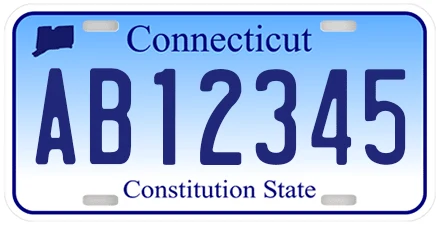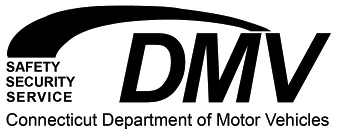Nowadays, many car dealers are increasingly showing their indifference towards consumers by selling poor-quality vehicles with registration or safety issues. Fortunately, you can access historical details about a vehicle through a Connecticut license plate lookup, which will help you avoid common pitfalls such as title scams, brand washing, and undisclosed damage.
Search any Connecticut license plate number for free on our site, and get a behind-the-scenes look into how the car was used and cared for—so that the previous owners' mistakes don't become your problems.
Free Plate Search
FAXVIN offers a free basic Connecticut license plate lookup that provides key information, allowing users to access crucial vehicle data without compromising personal privacy. This service is particularly valuable in today's used car market, where the average cost of cars keeps rising.
A free plate search provides:
- Vehicle Identification Number (VIN): The VIN is a crucial piece of information that unlocks a wealth of data about the car’s past and present condition. It allows you to check the full history, model details, engine specifications, and more.
- Check digit verification: This confirms that the VIN is valid, helping to ensure you're getting accurate information. It's an important step in preventing fraud and ensuring the legitimacy of the car‘s documentation.
- Basic vehicle attributes: The free report will list a few attributes including the trim level, color, engine type, transmission, body style, and other essential characteristics. These details help verify the seller's claims and ensure you're getting the vehicle you expect.
A Connecticut tag lookup is especially useful when the VIN is obscured or inaccessible. Some unscrupulous sellers may try to hide VIN information to conceal a vehicle's troubled history. In such cases, our license plate lookup becomes a reliable alternative for accessing crucial data.
Unscrupulous sellers may knowingly hide the VIN details to conceal a car’s troubled history or engage in schemes such as title washing.
Paid License Plate Check
While our free license plate lookup provides valuable initial information, it's always recommended to follow up with a full history report for a comprehensive understanding of the car’s background, especially for high-value purchases or when dealing with unfamiliar sellers.
Here are some of the details provided by our full report:
- Title Status: A salvage or rebuilt title indicates significant past damage. Vehicles with these titles are often less valuable and can be difficult to insure. Avoid cars with salvage titles unless you are prepared for potential hidden issues and higher maintenance costs.
- Inspection History: Regular inspections indicate a well-maintained vehicle. Look for gaps in the inspection history, which might suggest periods of neglect. Vehicles with consistent inspection records are generally more reliable.
- Accident History: If a car has been in accidents, the Connecticut license report will detail the extent of the damage. This information is crucial for assessing the car's structural integrity and potential future issues. Always have a mechanic inspect any repairs to ensure they were done correctly.
- Service Records: Detailed service records show regular maintenance and can indicate a car's overall condition. A well-documented service history adds value to the car and assures you of its upkeep.
- Odometer Readings: Consistent mileage records help verify the accuracy of the odometer. Discrepancies can indicate odometer fraud, which is a red flag. Always compare the odometer reading with the report and question any inconsistencies.
- Theft Records: Knowing if a car has previously been stolen can prevent legal complications. A history of theft might also affect the vehicle's resale value. Ensure the title is clear and not marked as stolen or recovered.
- Recalls and Defects: Open recalls need to be addressed immediately for safety reasons. Check if the car has any unresolved recalls and defects.
- Ownership History: Fewer owners typically mean less wear and tear. Multiple owners in a short period may suggest unresolved issues.
- Flood, Fire, or Hail Damage: Motor vehicles damaged by natural disasters can have long-term issues. Flood damage, in particular, can cause electrical problems that are hard to detect.
In essence, our Connecticut license data covers all reported incidences from the moment the car leaves the production line or dealership. It equips you to make better buying decisions when dealing with used cars that can either be a blessing or lemon in disguise.
Our Data Providers
Connecticut license plate search is based on thousands of reports and datasets from various reliable sources. FAXVIN aggregates information from multiple channels to provide comprehensive reports. Here are the top sources of information for our Connecticut license plate lookup reports:
- National Motor Vehicle Title Information System: NMVTIS is a federal database that provides information on a vehicle's title, odometer reading, and brand history. It's a crucial source for identifying stolen cars and those with salvage or junk titles.
- Insurance Companies: These provide valuable data on accident claims, total loss declarations, and sometimes repair histories. This information helps build a more complete picture of past incidents and the overall condition.
- State DMVs and Motor Vehicle Agencies: These official sources provide registration information, emissions test results, and sometimes inspection histories. They're essential for verifying a vehicle's legal status and compliance with state regulations.
- Service and Repair Facilities: Many repair shops and dealerships report service records to centralized databases. This information can provide insights into a vehicle's maintenance history and potential recurring issues.
- Vehicle Manufacturers: Manufacturers often provide data on original vehicle specifications, recall information, and warranty claims. This can be crucial for understanding the original features and any systemic issues it might have.
- Salvage Yards and Recyclers: These sources can provide information on vehicles that have been severely damaged or dismantled, which is vital for identifying cars that have been rebuilt or have a salvage history.
- Towing and Impound Records: This Connecticut license data can reveal if the car has been abandoned, impounded, or involved in legal issues.
- Fleet and Rental Agencies: Information from these sources can indicate if a car was previously used as a rental or fleet car, which can affect its value and condition.
- Consumer Protection Organizations: These groups often collect and share data on complaints, defects, and safety issues.
We combine data from reliable sources to offer a thorough Connecticut license plate lookup that covers the most important aspects that will help you gauge the car’s future reliability. Additionally, FAXVIN offers discounts for multiple reports, helping you save money during the car-buying journey.
How to Utilize this Data
FAXVIN CT license reports are invaluable for anyone dealing with used cars, whether you're a buyer or seller. The comprehensive report can help:
- Avoid purchasing lemons or problematic motor vehicles.
- Negotiate better deals based on accurate information.
- Compare multiple cars more effectively.
- Make more informed purchase decisions.
Remember to compare our data with what car dealers tell you. If something doesn't match, do not hesitate to ask about that aloud.
Our license plate lookups include a CarRank score, which gives an overall assessment of a car’s condition and value based on its history and current market factors.
Ownership Check
Although the names of previous owners might not be disclosed, you can typically find information about the duration of each ownership, the total number, and the states where the car was registered. Frequent or rapid changes in ownership could indicate that prior owners were eager to sell, potentially due to concealed issues with the vehicle.
Connecticut Law on License Plates
Connecticut adheres to the Driver's Privacy Protection Act (DPPA), which restricts access to personal information associated with vehicle registration records. As a result, a Connecticut license plate check doesn’t provide any personal details about vehicle owners.
Only certain authorized parties like law enforcement, government agencies, and approved businesses can access personal information tied to Connecticut license plates.
Public searches are limited to non-personal data.
Registering a Vehicle
To register a vehicle in Connecticut, ensure you’ve settled any unpaid property taxes, cleared parking tickets, completed emissions testing if required, and have valid auto insurance. Prepare necessary documents, including proof of ownership (title or prior registration), a valid ID, proof of insurance, and a completed registration application.
Out-of-state vehicles may need emissions testing and VIN verification. Schedule a DMV appointment online, bring your documents, and pay the required fees. At your appointment, you’ll receive license plates and a registration certificate. New residents have 90 days to register.
Replacing Damaged, Lost, or Stolen Plates
If your Connecticut license plates are damaged, lost, or stolen, follow these steps to replace them:
- Damaged Plates: Replace online with your driver's license, plate info, and fee.
- Lost/Stolen Plates: File a police report for stolen plates, complete Form E-159, and bring it along with your registration and insurance to the DMV. A fee applies, which is reduced if a police report is provided.
Design, Types and Law
Serial Format & Design

Connecticut's license plates have evolved through various formats over the years, accommodating standard passenger vehicles, specialty plates, and vanity tags. The current format, adopted in August 2015, features two letters followed by five numbers, separated by a dot (e.g., AB·12345), with the first digit possibly being zero.
Earlier Formats:
- Pre-2013: Three numbers followed by three letters (e.g., 123-ABC).
- July 2013 – August 2015: A transitional format combining numbers and letters without separators (e.g., 1ABCD2), later updated to include a dot for readability (e.g., 1AB·CD2).
A standard Connecticut license plate has a gradient background, transitioning from light blue at the top to white at the bottom. The text is bold navy blue for high contrast, with the format featuring two letters followed by five numbers, separated by a small dot. "Connecticut" appears in uppercase navy blue across the top, while the state nickname, "Constitution State", is often displayed in smaller text at the bottom.
Types of Plates
The Connecticut DMV offers several types of special license plates, including:
- Standard Passenger Plates;
- Recreational Plates;
- Vanity Tags;
- Animal Population Control Plates;
- Classic Plates;
- Conserve Wildlife Tags;
- Police Memorial Plate;
- Wartime Veteran Plate;
- Military Plates.
Law on License Plates
According to state authorities, Connecticut license plates are required for passenger cars, vans, trailers, motorhomes, trucks, and motorcycles. Motorcycles and trailers must display a plate on the rear, while other vehicle classes require plates on both the front and rear. Connecticut no longer uses registration decals on plates or windshields.
Summary
FAXVIN’s Connecticut license plate lookup protects you from hidden risks in the used car market, offering essential vehicle history details like VIN, title status, and accident records through simple, anonymous searches. With data from trusted sources, our service helps you avoid scams, spot issues, and make confident, informed decisions—all while safeguarding your privacy. Start your free search today!
Useful Resources
- CT DMV - Renew vehicle registration
- CT DMV - Cancel plates and Registration
- Check Vehicle Registration Status
- Get Special or Vanity Plates
Frequently Asked Questions
Was this article helpful?

